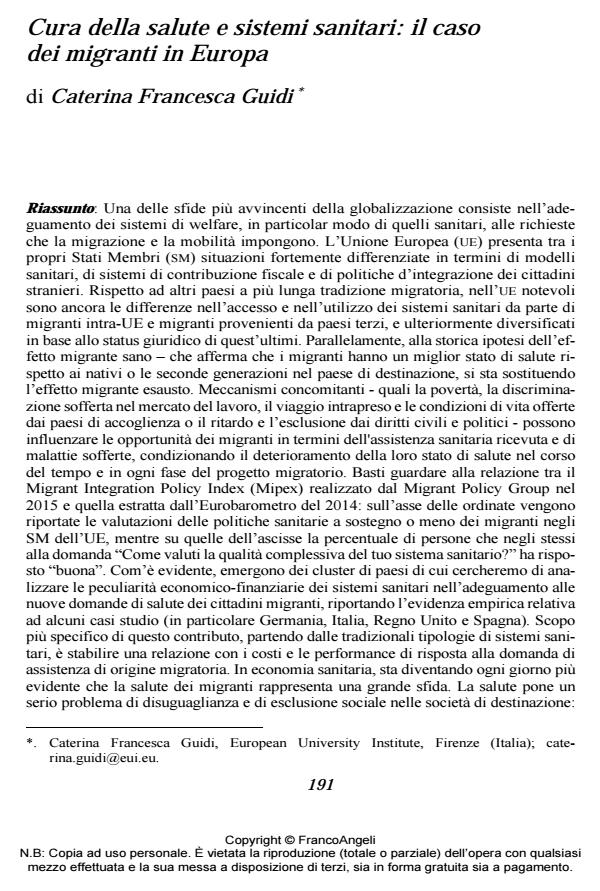Healthcare and health systems: the case of migrants in Europe
Journal title MONDI MIGRANTI
Author/s Caterina Francesca Guidi
Publishing Year 2019 Issue 2019/2
Language Italian Pages 17 P. 191-207 File size 207 KB
DOI 10.3280/MM2019-002010
DOI is like a bar code for intellectual property: to have more infomation
click here
Below, you can see the article first page
If you want to buy this article in PDF format, you can do it, following the instructions to buy download credits

FrancoAngeli is member of Publishers International Linking Association, Inc (PILA), a not-for-profit association which run the CrossRef service enabling links to and from online scholarly content.
In these globalization times, one of the most compelling challenges is the adaptation of welfare systems, especially health systems, to the requests that migration and mobility impose. The European Union (EU) presents in its Member States (MS) highly differentiated situations in terms of healthcare systems, models, financing systems and policies of integration adopted towards foreign citizens. Compared to other countries with a longer migrant tradition, there are still significant differences in access and use of health services by intra-EU migrants and migrants from third countries in the EU, further diversified according to the legal status of the latter. In parallel, the historical hypothesis of the healthy migrant effect - which states that migrants have a better state of health than natives and second generation in their countries of destination, has been replacing by the exhausted migrant effect. Concurrent mechanisms - such as poverty, discrimination suffered in the labor market, the journey undertaken and the living conditions offered by the host countries or the delay and exclusion from civil and political rights - can influence the opportunities of migrants in terms of healthcare received and diseases suffered, influencing the deterioration of their state of health over time and at every stage of the migration project. Looking at the relationship between the Migrant In-tegration Policy Index (Mipex) carried out by the Migrant Policy Group in 2015 and the values extracted from Eurobarometer (2014): on the vertical axis, the health policies in support of migrants in the EU MS are reported while the percent-ages of people who replied "Good" to the question: "How do you evaluate the overall quality of your healthcare system?" are on the horizontal axis. As it can be seen, clusters of countries emerge: from those we will try to analyze the economic-financial peculiarities of health systems to the adaptation to new health needs of migrant citizens, reporting the empirical evidence related to some case studies (in particular, Germany, Italy, United Kingdom and Spain). Starting from the traditional types of health systems, a more specific aim of this contribution is to estab-lish a relationship with the costs and performance of the response to the assistance request of migratory origin. In health economics, it is becoming more and more evident that the health of migrants is a major challenge. Health poses a serious problem of inequality and social exclusion in destination societies: understanding the variables, founders and co-founders, is a fundamental exercise to study the determinants of access, use and quality of health services for migrants. The de-fense of the sustainability of health systems on the funding side is a prerequisite for this great challenge to be tackled and won in Europe.
Keywords: Reproductive health, gender-based violence, migration, Vtp, Lampedusa, Sicily
Caterina Francesca Guidi, Cura della salute e sistemi sanitari: il caso dei migranti in Europa in "MONDI MIGRANTI" 2/2019, pp 191-207, DOI: 10.3280/MM2019-002010